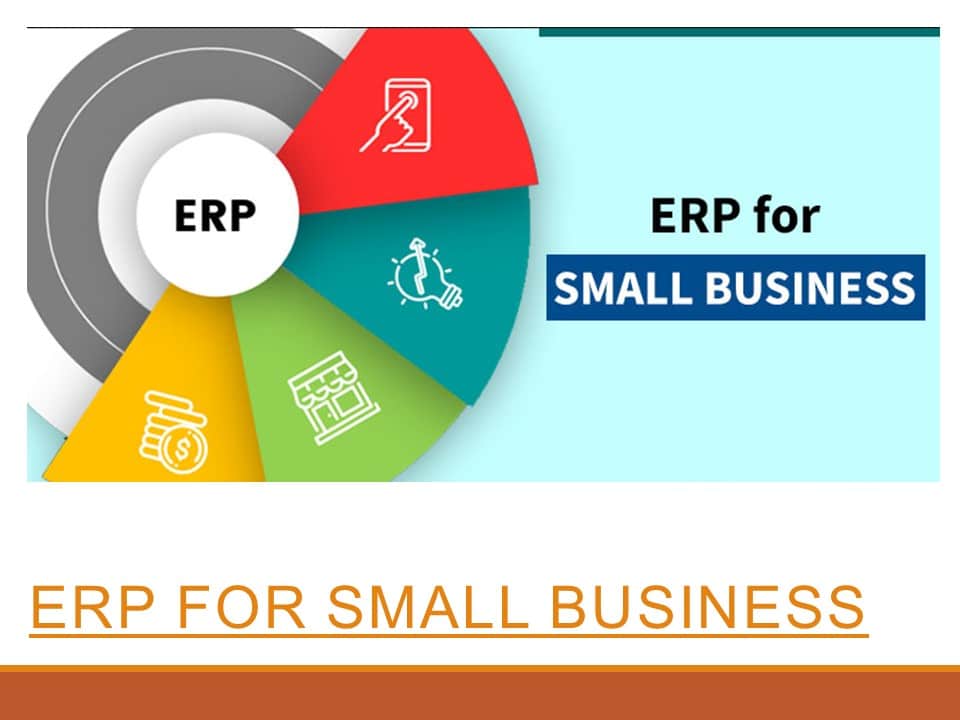Implementing an Enterprise Resource Planning (ERP) system can be a transformative step for small businesses, revolutionizing how they manage their operations and setting the stage for growth and efficiency. Here’s a comprehensive overview of ERP for small businesses:

What is ERP for Small Businesses?
ERP systems integrate core business processes and functions into a single platform, providing a centralized database and a unified view of operations. For small businesses, ERP offers several advantages:
Streamlined Operations and Efficiency
- Integrated Data: ERP systems centralize data from various departments, eliminating data silos and enhancing visibility across the business.
- Process Automation: Automating repetitive tasks and workflows improves efficiency, reduces errors, and saves time for strategic initiatives.
Scalability and Growth Enablement
- Adaptability: ERP solutions for small businesses are scalable, accommodating growth without necessitating costly infrastructure changes or system replacements.
- Data-Driven Decisions: Real-time insights and analytics empower informed decision-making critical for growth strategies.
Cost Efficiency and Resource Optimization
- Operational Savings: ERP systems optimize resources, streamline workflows, and minimize waste, leading to cost reductions over time.
- Flexible Pricing Models: Many ERP vendors offer subscription-based or modular pricing, making them accessible and cost-effective for small businesses.
Choosing the Right ERP for Small Businesses
Selecting an ERP system tailored for small businesses involves considering specific needs and objectives:
- Scalability: Ensuring the ERP can grow with the business without causing disruption or incurring significant additional costs.
- User-Friendly Interface: Intuitive interfaces facilitate user adoption, simplifying training and implementation for employees.
- Customization and Flexibility: The ability to customize the ERP to fit unique business processes and requirements is crucial for small businesses.
Navigating Success: How ERP Systems Empower Small Businesses
In the dynamic landscape of small businesses, operational efficiency, streamlined processes, and smart resource management play pivotal roles in driving growth and success. Implementing an Enterprise Resource Planning (ERP) system tailored for small businesses can be a game-changer, revolutionizing the way these enterprises manage their operations. Let’s delve into how ERP systems are empowering small businesses to thrive in today’s competitive environment.
Understanding ERP for Small Businesses
ERP systems integrate various functions within a business such as finance, inventory, sales, CRM, HR, and more into a centralized platform. For small businesses, ERP software brings several benefits:
Streamlined Operations and Efficiency
Unified Data: ERP systems consolidate data from various departments into a single source, eliminating data silos and providing a comprehensive view of the business.
Process Automation: Automating repetitive tasks reduces manual errors, speeds up processes, and frees up valuable time for employees to focus on strategic tasks.
Scalability and Growth Opportunities
Adaptability: ERP solutions designed for small businesses offer scalability, allowing for easy adjustments as the company grows, without the need for significant system overhauls.
Improved Decision-Making: Real-time insights and analytics provided by ERP systems enable informed, data-driven decision-making crucial for growth strategies.
Cost Efficiency and Resource Optimization
Reduced Operational Costs: ERP systems optimize resource allocation, minimize waste, and streamline workflows, leading to cost savings over time.
Flexible Pricing Models: Many ERP vendors offer subscription-based or modular pricing suitable for small businesses, providing cost-effective solutions.
Choosing the Right ERP for Small Businesses
Selecting the appropriate ERP system for a small business involves considering specific needs and goals:
- Scalability: Ensuring the ERP can scale with the business as it grows without disrupting operations or incurring substantial costs.
- User-Friendly Interface: An intuitive interface facilitates user adoption, making training and implementation smoother for employees.
- Customization and Flexibility: The ability to tailor the ERP to meet unique business processes and requirements is crucial for small businesses.
Examples of ERP Systems for Small Businesses
Several ERP systems cater specifically to small enterprises:
- SAP Business One: Offers comprehensive functionalities designed for small and mid-sized businesses.
- Microsoft Dynamics 365 Business Central: Cloud-based ERP with customizable modules suitable for small businesses.
- NetSuite by Oracle: Provides a unified platform for financials, CRM, and e-commerce tailored for small and growing businesses.
Conclusion: Unlocking Small Business Potential with ERP
In the competitive landscape where efficiency and agility are essential, ERP systems empower small businesses to compete on a level playing field. By integrating processes, providing real-time insights, and fostering scalable solutions, ERP systems streamline operations, drive growth, and pave the way for sustained success.
As small businesses continue to evolve and adapt, leveraging the capabilities of ERP systems becomes a strategic imperative, enabling them to navigate challenges and seize opportunities in today’s ever-changing market.